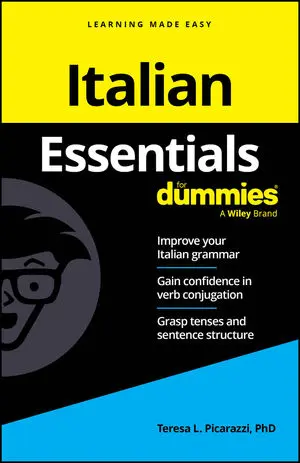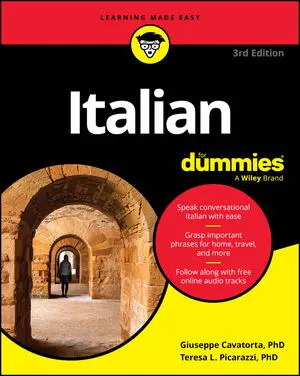This builtin is not currently supported: Animation
- Book & Article Categories

- Collections

- Custom Solutions
 Main Menu
Main MenuBook & Article Categories
 Main Menu
Main MenuBook & Article Categories
Teresa L. Picarazzi
Teresa Picarazzi, PhD, has taught Italian language, literature, and cinema for more than 30 years. She now teaches Italian at The Hopkins School in New Haven. She has lived, studied, and worked in Florence, Siena, Urbino, Cortona, and Ravenna, Italy. She has written books and several articles on Italian politics and culture.
Articles & Books From Teresa L. Picarazzi
An essential guide for Italian language learners Italian Essentials For Dummies walks you through the foundations and essentials of introductory Italian. It covers Italian grammar, vocabulary, pronunciation, verb forms and tenses, and more, demonstrating exactly what you need to know to quickly get up to speed on the basics.
The Dummies language learning method makes it easy to speak Italiano Italian For Dummies is your quick-start guide to the Italian language. It offers friendly and clear instruction on Italian grammar and pronunciation, and even some cultural background to spice things up. You'll also get ample practice opportunities, so you can quickly build your skill in conversational Italian.
Cheat Sheet / Updated 11-03-2025
Planning a trip to Italy? Learn some basic Italian to make it more fulfilling. Get to know Italian greetings, question words, numbers, and the days of the week. Also, be sure to know how to ask for help in Italian so you're prepared for emergencies. And something very important: how to order food and drinks! This Cheat Sheet includes some useful phrases you can use every day as well as some phrases for dealing with an emergency and ordering food and drink.
Cheat Sheet / Updated 11-02-2023
As you're studying Italian, either on your own or in a course, keep this Cheat Sheet handy for a quick reference on articles, personal pronouns, tenses, and more.Definite and indefinite articles, and the partitiveIn Italian, articles vary in gender, number, and spelling. They’re the best predictor of a noun’s gender.
Article / Updated 05-18-2023
Learning numbers and counting in Italian isn't complicated. In fact, the Italians follow many of the same patterns that we do in English. There are a few differences, but it's when it comes to numbers and counting in Italian, it's really just a question of memorizing.
In Italian, as in English, there is a unique number from 0 – 16.
Article / Updated 03-15-2023
By mastering the basics of conversation in Italian, you put yourself and the person you're talking to at ease. Everyone should learn essential Italian conversational words and phrases before traveling to Italy. These words and expressions are sure to come up in most everyday conversations.
Courteous phrases
Being polite is just as important in Italy as anywhere else in this world.
Article / Updated 02-09-2023
Whether you're on a short visit to an Italian-speaking country or you're planning to take up residence in Italy itself, knowing how to order food in Italian is essential. Eating out can be a lot of fun, especially if you know some basic vocabulary.
The Italian bar is really what Americans would call a café. There you can get breakfast (coffee and a pastry), snacks, sandwiches, and salty snacks to accompany your before-dinner drink.
Learning Italian is easy with Dummies Italian Workbook For Dummies is for beginners who want to get started learning Italian. Packed with foundational grammar and integrated vocab, Italian Workbook For Dummies will set new language learners on their way to a wonderful experience learning this beautiful romance language.
Cheat Sheet / Updated 02-24-2022
The Italian language is adapting to the rhythms of modern life with the introduction of new idioms and the construction of simpler, more concise sentences and paragraphs. The basic rules of the Italian language, however, stay the same. Despite the ongoing transformation of the language, these rules remain the foundation that stabilizes it.
Article / Updated 10-01-2021
When traveling in Italy, you'll find that the Italian words and phrases you use most frequently will be the common greetings. The words and phrases will quickly become second nature as you use them day in and day out with everyone you come across.
Saying hello and goodbye
As you'd expect, you should use a polite greeting when you run into someone you know or want to know.






